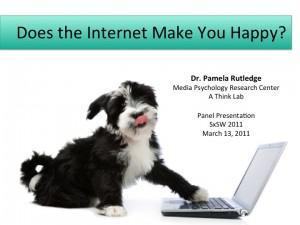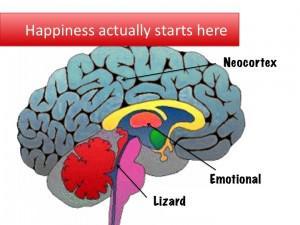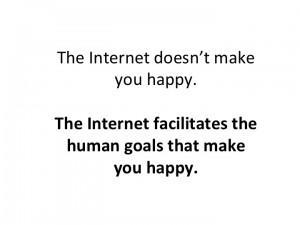
The question is: does the Internet make you happy?
My answer? No. Let me tell you why.
First of all, happiness is not about the tools.
Second, happiness comes from within. The ‘within’ I’m talking about is the brain. Humans are subject to “impact bias” which means that we always think things and events are going to make us happy, but that isn’t the case. Most of what we feel comes to us from sensory input from unconscious portions of the brain—our instinctual lizard brain or our emotional mammalian brain.

Up at the top is the Neocortex, the conscious brain, blissfully going along on the assumption that it’s in charge when it’s really just responding to a pop of oxytocin or dopamine. But the rational brain is an interpreter and planner; its job is to make a story that fits sensory input based on stored previous experience and context. At the lizard level, we don’t distinguish readily between real and virtual in our visceral response. Consequently, what we experience online that triggers and satisfied the basic human needs, such as connection, affiliation, group membership, and social validation—may be technically ‘virtual’ but they are interpreted as real experience by the lizard brain.

Did you salivate? Did you smell lemon? Did your nose crinkle? All of these are lizard brain reactions to images in your mind—to a virtual world that taps your personal database of experience and metaphors. Just like with interactive technology.
The Psychology of Happiness
Martin Seligman, father of positive psychology created a formula for happiness.

H is for happiness and equals “set point” plus “circumstances” plus “voluntary activity.” (Leave it to an academic to make even happiness sound so grim.)
S is for ‘Set Point” and is your biology. Blame the animal consortium in your brain or your mother and father. Each of us has a biological range of happiness, just like extroversion and introversion, which determines our basic degree of optimism. Some people are just naturally happier than others. It’s adjustable, but it takes work. (Also, before you get down on yourself for not being continually happy, remember that, biologically, we are wired to notice danger and react much more powerfully to fear. In the wild, there wasn’t much upside in noticing the flowers compared to the downside of missing the tiger.)
C is for ‘Circumstances’ and are, like it sounds, our context or environment. Those are often out of our control. The human brain however often reframes negative experience into a more positive light over time.
That brings us to “V” for voluntary activities. This is important because these are the things you can control. And this is where the Internet really delivers.
We can look at Internet impact through the lens of positive psychology. Researchers have identified critical areas that contribute to happiness. I said earlier that the Internet doesn’t make you happy. It doesn’t make you sad either. The Internet is just a tool, and it reflects and sometimes amplifies human activity and goals, which haven’t changed much since we grew our Neocortex. As a tool, though, the Internet is a game changer in how it facilitates things that can make you happy.
Most importantly, these things can positively impact all areas of life, not just Internet-based activities.
- Voice:
- The belief that you have a right to speak—it doesn’t matter who you are. It’s changed the nature social power structure.
- Connection.
- The Internet connects us; this allows to expand our social circles, build social capital, social support, group affiliation and identity, and have our existence and ideas validated by others in ways never before possible.
- Social validation
- Social validation increases our sense of agency. Agency is about taking action and having it matter; being able to act on your environment with results
- Agency:
- Belief that your actions matter encourages you to take risks and engage, leading to self-efficacy and flow
- Self-efficacy
- Self-efficacy is the belief that you are capable of meeting the challenges you face and this leads to resilience in the face of adversity and increased optimism
There is a long list of the most common things that people say make them happy: for example, seeing children smile, laughing, helping others, connecting with others, love, freedom, choice, play, gratitude, competence, good health, and sex. All of these, except arguably “sex,” can be facilitated by or experienced on the Internet.

We have to get over asking what does technology “do to us” and start asking what, as humans, we are trying to do—as individuals and as a member of a global community—and how can the technology help.
——
Here are all the slides from my presentation. SxSW Panel Rutledge Segment: Does the Internet Make You Happy? View more presentations from Media Psychology Research Center

